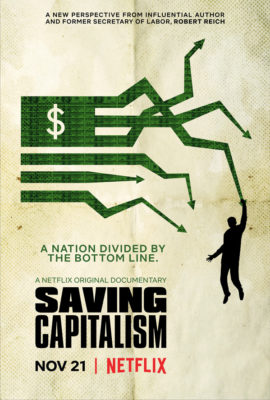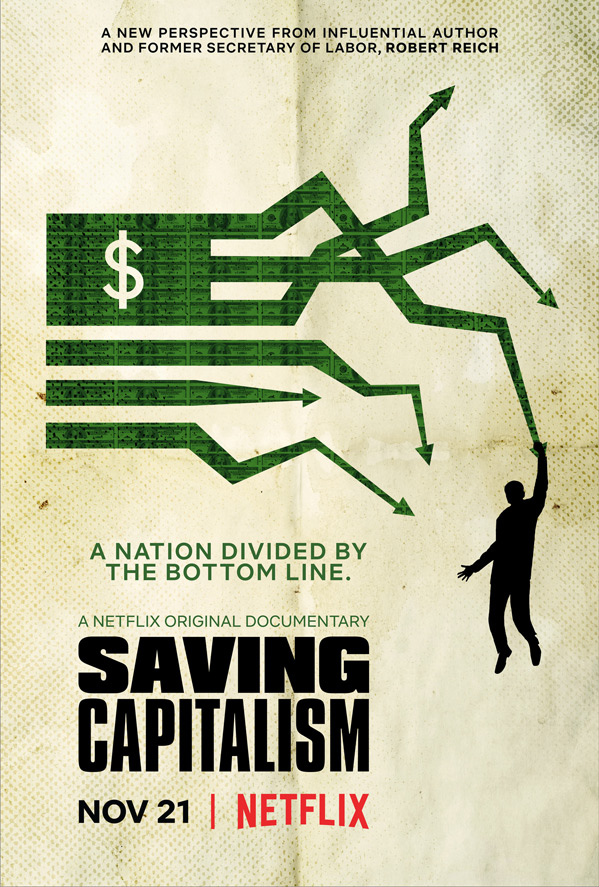Robert Reich, former Secretary of Labor under President Clinton and current Professor of Public Policy at the University of California at Berkeley, wrote a book titled “Saving Capitalism: For the Many, Not the Few” in 2015, and this year, Netflix created a documentary based on it.

Release Year: 2017
Directors: Jacob Kornbluth, Sari Gilman
Running Time: 1h 30min
Watch trailer
The film “Saving Capitalism” follows Reich on his book tour as he goes off the beaten path and also meets with people in what are more like listening sessions, town halls, or even in some cases organizing sessions (meant to empower those who agree that urgent action is called for).
His goal was not so much to sell books, but to go to places where people had likely never heard of him and talk to people who may have never read one of his books.
The main point made in the film (and presumably the book, which, full disclosure, I have not read yet) is that capitalism is what we make of it.
Capitalism, like any economic system, is not inherently good or bad, moral or immoral. Depending on how it is set up, what rules and regulations are used in organizing the system, one may judge its effects and therefore its organization to be good or bad, but the base system itself is neutral.
For example, as much as the term “free market” is used in the U.S. to describe our economy, there really is no such thing as a free market.
All markets are constructed for somebody’s benefit, and we should always ask the question, Who was this market constructed to serve?
The government has to set rules to determine the basic bounds and functioning of any market that is to be successful in offering people choices.
In setting those rules, the government can effectively decide who wins and who loses, who makes money and who loses money in our economy.
Since the Reagan administration, there has been systemic dismantling of the rules that once governed our financial system — billed by the right wing as “deregulation” to get the government out of the “free market.” But as Reich contends, this apparent dichotomy between regulation and “deregulation” is totally false; there is always regulation, the question is what kind of regulations you have.
As Reich explains, these rules can and do change, no matter how many of our elected representatives like to claim that they can’t.
The rules reflect the interest of those with the most power, and in a self-reinforcing cycle, those with more money then have more political power, which they use to get themselves even more money by further manipulating the rules in their favor.
The film notes that though lobbying has always existed, the problem is the massive magnitude of corporate lobbying compared to everyone else that has created regulations that consistently function to funnel income and wealth to the top. Corporate interests spend $34 on lobbying for every $1 spent by unions and all other public interest groups combined.
Reich traces the origins of this increase of corporate lobbying to 1971, when the- corporate lawyer and future Supreme Court Justice Lewis F. Powell, Jr. wrote a memo to his friend who was a leader in the U.S. Chamber of Commerce at the time. In it, he claimed that the business community was under attack, and that “political power is necessary; that such power must be assiduously cultivated, and that when necessary, it must be used aggressively and with determination.”
The Powell Memo, which linguist George Lakoff has called “a fateful document”, became a manifesto for big business, trade associations, and lobbying groups.
This manipulation of the economy in favor of corporations over the last thirty plus years has caused our economy to become more and more inequitable and also unsustainable. As average people feel the crunch more every day, they are understandably angry and frustrated. Survey data shared in the film note that in 1964, 77% of people trusted the government to do the right thing.
In 2017, that number is down to just 20%.
In a 1997 speech that we see a snippet of in the “Saving Capitalism,” Reich essentially predicted the rise of populism and Trump in response to the inequality in our economy that has been created by the rules of the economy being rigged in favor of those who can afford to buy influence.
“We are on the way to becoming a two-tiered society composed of a few winners and a larger group of Americans left behind, whose anger and whose disillusionment is easily manipulated.”
Now that Donald Trump has turned those manipulated feelings into enough votes to take the White House via the Electoral College, he is on the verge of rewarding himself and other crony capitalists with an even bigger payday… if the House and Senate Republicans can figure out how to procure the votes for the final version of their tax scam, which it appears they have.
In the film, Reich tells a group of his graduate students at Berkeley that in his fifty years of working in and out of government, “we’re in deeper #&$% now than we were then!” But he also stays positive, because every time in American history “when capitalism has gone off the rails, our instinct is to put it back on the rails.”
He believes in the power of political organization and community activism and action. It is up to us to change the rules. Through voting, yes, but also through calls and letters to our members of Congress and marching in the streets.
I will not be surprised if there are impromptu protests shutting down cities across the country, larger than January’s record-setting Women’s March, if the Republicans’ massive wealth transfer scheme makes it to Trump’s desk. See you there!

